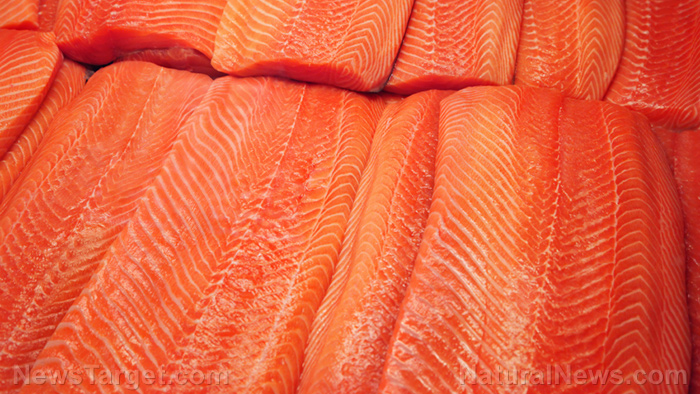FRANKEN-SALMON SECRETLY APPROVED by highly corrupt FDA so America can start sucking down lab-concocted fish by tricky-named “Wildtype” brand
Yes, the Food and Drug Adulteration agency (FDA) has gone and approved what could be the first salmon that cause cancer and dementia as they are grown in a laboratory Frankenstein style with little to no safety testing whatsoever, except of course by the freakshow that made it. Welcome to the Island of Dr. Moreau. Dinner is served. The new Franken-salmon is called “Wild-Type” to TRICK all consumers into thinking they are wild caught. This is highly deceptive advertising and should be ILLEGAL. That’s like calling GMO corn “Organi-Corn.”
The U.S. Food and Drug Administration (FDA) has quietly approved the first lab-grown salmon for human consumption, raising concerns among food safety experts about the lack of independent testing and public oversight in the approval process. The product, developed by Wildtype Foods — a company backed by investors including Jeff Bezos and Leonardo DiCaprio — has already been introduced in high-end restaurants in Portland, Oregon, with plans for nationwide expansion.
Unlike traditional Atlantic salmon, which has been consumed for thousands of years, the lab-grown version was approved based solely on the manufacturer’s own safety claims, without independent verification or animal feeding trials. The FDA stated it found “no basis” to dispute Wildtype’s conclusion that its product is “as safe as comparable foods produced by other methods.”
Jaydee Hanson, policy director for the Center for Food Safety and an expert in synthetic biology, criticized the approval as “outrageous,” noting that the FDA allowed the company to use the “Generally Recognized as Safe” (GRAS) designation — a classification originally intended for substances with long histories of safe consumption.
“The ‘Generally Recognized as Safe’ designation was never intended for this,” Hanson said. “The FDA is negligent in allowing a company to use the self-approved generally recognized as safe method.”
How lab-grown salmon is made — and why experts are concerned
Wildtype’s salmon is produced by culturing fish cells in steel vats using a proprietary nutrient blend, including undisclosed ingredients and growth factors designed to accelerate cell multiplication. One such factor, fibroblast growth factor-2 (FGF2), has raised concerns among scientists about potential residual traces in the final product and their possible links to uncontrolled cell growth.
Hanson pointed out additional unknowns, including the undisclosed method used to give the salmon its pink color and whether antibacterial agents are used to maintain cell health. “The company doesn’t divulge what it uses to give the salmon its pink color,” he said. “They likely need some kind of anti-bacterial product to keep the cells healthy, but it isn’t clear what product they’re using.”
A Troubling Precedent in Food Regulation
The approval marks a significant shift in how novel foods are evaluated, bypassing traditional safeguards such as public comment periods, long-term health studies, and independent testing. Unlike pesticides — which undergo extensive public review despite not being directly consumed — lab-grown salmon was approved without similar scrutiny.
Several states, including Florida, Alabama, Mississippi, Montana, and Indiana, have already banned the sale of lab-grown meat, citing insufficient safety data. These bans reflect growing skepticism about federal regulators prioritizing corporate interests over public health.
Potential Cancer Risks Under Investigation
Researchers have raised alarms about the use of genetically modified cell lines in lab-grown meat production, some of which exhibit cancer-like behavior. Patents filed by companies such as Memphis Meats describe modifying cell lines by altering tumor-suppressing proteins, while JUST Inc.’s patents reference growth factors that could promote uncontrolled cell proliferation.
A Bloomberg investigation found that some immortalized cell lines used in lab-grown meat are “technically speaking, pre-cancerous and can be, in some cases, fully cancerous.” Harvard Stem Cell Institute researchers have also documented mutations in the TP53 gene — a critical tumor suppressor — in lab-cultured cell lines.
What Consumers Can Do
With federal oversight lacking, experts recommend vigilance:
- Read labels carefully—Lab-grown products may be labeled as “cultured,” “cell-based,” or “lab-grown.”
- Ask restaurants about sourcing—High-end establishments are early adopters.
- Support transparency laws—Advocate for mandatory labeling and independent safety reviews.
- Choose traditional or organic options—Opt for verified wild-caught or organic seafood and plant-based proteins.
The FDA’s approval of lab-grown salmon sets a concerning precedent for food regulation, prioritizing corporate self-assessment over independent safety verification. As this technology expands, consumers, lawmakers, and scientists must demand greater transparency to ensure food safety and public trust. Without rigorous oversight, the long-term health and environmental impacts of lab-grown meat remain uncertain — leaving the public as unwitting test subjects in a high-stakes experiment.
Tune your food news frequency to FoodSupply.news and get updates on more toxic foods that corporate America loads the grocery store shelves with to drive up chronic diseases and disorders so Big Pharma can take your money.
Sources for this article include:
NaturalNews.com
NaturalHealth365.com
Read full article here


